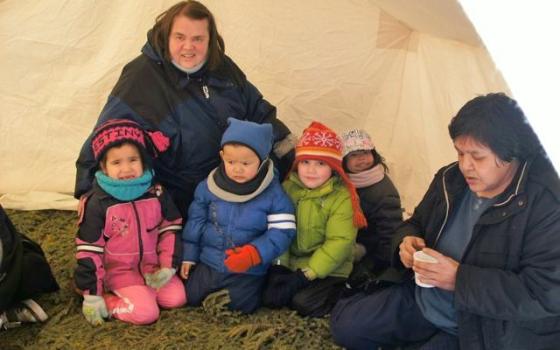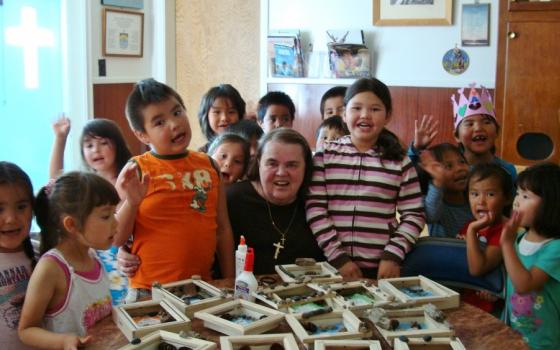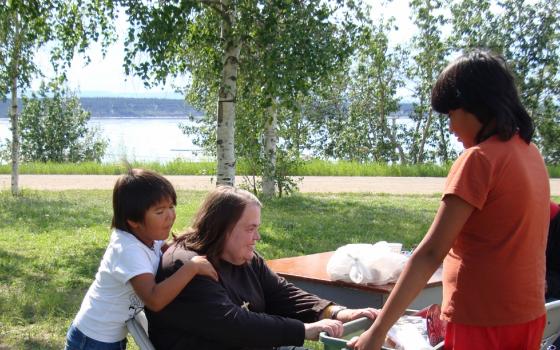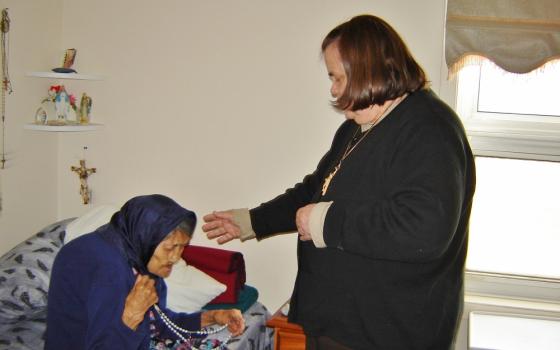Felician Sr. Celeste Goulet had never met a native person when she first felt called by the Holy Spirit to work with them following a 30-day retreat in 1973.
Now she's a pastoral leader among the North Slavey people of Tulita, Northwest Territories, where she's been ministering since 1979. Goulet runs a preschool, ministers sacraments in a diocese without a priest, and provides support for victims of alcoholism and sexual abuse. The recipient of the Catholic Missions in Canada's 2016 St. Joseph Award, Goulet has also received the 2008 Government of Canada's Award for Excellence in Early Childhood Education and the 1999 Status of Women Council of the Northwest Territories Wise Women Award.
Goulet attributes her successes to meeting the people where they are.
"They're a people whose spirituality is deep, but it's a spirituality focused on the creator of the land," she said. "That's when you most see their generosity and who they really are."
GSR: Tell me about this ministry. What kind of challenges do native people face as a community? What's your everyday work like?
Goulet: I'm the pastoral leader for the church here. We haven't had a residential priest for about 20 years, and for a long time, we hadn't even had a priest in the region to rotate. For at least the last five years, we might get a priest two or three times a year, so I do most of the baptisms, preparation for Holy Communion, and all the sacramental preparations, marriages and funerals.
I also run a preschool program that I started at 37, and I enjoy doing that. It's a way of connecting with the parents and the community, too, and developing the child in their atmosphere and in the culture.
I think the most challenging part would be the addictions, especially of alcohol and drugs. It's a sickness, sort of self-destructing for a lot of the people. A lot of them who are addicted have a common experience, but the main one they are dealing with would be the experience that many of them had in residential school, basically being separated from their parents for so long and being taken away for their education. Many of them were abused in many ways, but mainly sexually abused from teachers or some from religious.
What does pastoral care for that look like?
I think reconciliation is really reopening a lot of hurt for the people. [Pastoral care] is basically listening, being there not to impose but to support and to help them through their pain.
[Alcohol and sex abuse] are different [when it comes to support]. I support those going through alcoholism by continuing to go to AA meetings, and my door is always open when they need to talk.
Some with sexual abuse might need more professional help. I'm there initially to help them and guide them, to take the right course that they need to take, depending on how deeply hurt they are.
Have you met any resistance in this ministry?
The resistance is more from non-aboriginal people. Many of them come and have their own agenda, so they have their different ways of approaching solutions, and sometimes, I think, since I've been here so long, they don't appreciate what other helpers — other non-aboriginals — are doing. That makes it hard. I understand what they're saying; I understand that some people come without really knowing the culture and trying to impose their way of healing without understanding how first-nation people heal.
This woman that came, she spoke to me about developing a healthy family. I don't know if it's just her personality, but when she's in the store, she doesn't talk to anyone. The native people like for you to reach out and shake their hand — because we're the ones who are on their land — and show that we accept them by going to their cultural events, for example, like drum dances or feasts. And a lot of these people, like this woman, she'll never go to the feast, so they don't see her as appreciating the culture or who they are. She gets upset with them if they don't come to her programs, but she doesn't go to them, either. The feast is one of the central points of their community life, so just going, being present among them and showing that you want to be part of who they are. There's nothing hard that you have to do, but it may be uncomfortable.
Did you have previous experience that has equipped you for this specific ministry, or were you learning on the spot?
A little of both. I struggled through school because I had bronchial asthma and other complications that affected my speech, so I didn't talk until I was about 10. So I was different from other kids when I was young, and I think when I came [here], they realized that I wasn't imposing, but that I respected them as people, and they learned to respect me the same way. I didn't talk down to them, and I was learning from them like they learned from me. I enjoy going out on the land with them and being with them.
What have you learned about the indigenous community?
I've learned that they knew Jesus before the missionaries came; they just didn't have a name for him. They knew there was a creator, knew that someone was guiding them in life, and they do express it differently.
When you're out on the land with them, you just see their connection to the land and their spirituality that guides them. It's when you're out on the land with them, while they're trapping, hunting, fishing, that you see how much they love each other. When they're out on the land, they're free of alcohol, addictions. It doesn't come into their life as much as in town.
A lot of people I hear, especially in the United States, say that native people are just drunks, that they just want everything free. That's not true. They feel entrapped in a reservation, or in the communities here, but it's not that they want everything free; it's that they used to live on the land where everything was free. The land, for them, is everything.
How do you see the Holy Spirit in your work?
I think the Holy Spirit is primary, like a great friend and a great person. I remember one time, the first year I was up here, our provincial came to visit. I told her that before I came up here, I used to always pray to Jesus. He was my main person of the Trinity who I'd focus my prayers on. But lately, my prayers have been to the Trinity. And she said, 'That's because the Trinity has become your community and your prayer life.' The Holy Spirit has truly been my guide, day in and day out.
[Soli Salgado is a staff writer for Global Sisters Report. Her email address is ssalgado@ncronline.org. Follow her on Twitter:@soli_salgado.]




